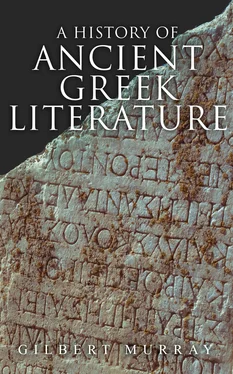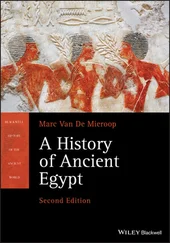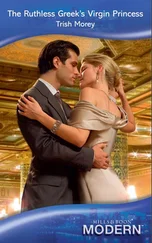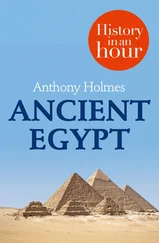Before the sixth century we get no definitely Orphic literature, but we seem to find traces of the influence, or perhaps of the spirit, from which it sprung. The curious hymn to 'Hecatê the Only-born' in the Theogony (411 f.) cannot be called definitely Orphic, but it stands by itself in the religion of the Hesiodic poems. The few references to Dionysus in Homer have an 'interpolated' or 'un-Homeric' look, and that which tells of the sin and punishment of Lycurgus implies.
the existence of an Orphic missionary tale. 8The eternal punishment of the sinners in λ seems Orphic; so does the curious fact that the hero saw none of the blest. He could not, because he was not initiated. The Homeric preludes to Ares, to. Athena, and perhaps that to Poseidon, show some traces of the movement. Among the early epics the Alcmônis * dealt largely with purification, and contained a prayer to 'Zagreus, all-highest of all gods.' The Corinthian epics of Eumêlus show a similar strain. Eumêlus was of the clan Bacchiadæ, his Eurôpia * was about Dionysus, and he treated the Orphic subjects of Medea and the Titan War. Several epics, like the Minyas, * contained apocalyptic accounts of Hades. The important fact is that the mystical and 'enthusiastic' explanation of the world was never without its apostles in Greece, though the main current of speculation, as directed by Athens, set steadily contrariwise, in the line of getting bit by bit at the meaning of things through hard thinking.
1Jahn-Michaelis, Bilder-Chroniken . The Tab. Il. is in Baumeister's Denkmäler .
2See Bethe in Hermes , 26.
3Ath. 481 e, 477 d.
4Pind., Nem. 2. Cf. Θ,499.
5See esp. 31.
6Paus. ix. 31, 4.
7Herodt. vii. 6.
8Z., 132 f.
III
THE DESCENDANTS OF HOMER, HESIOD, ORPHEUS
Table of Contents
THE end of the traditional epos came with the rise of the idea of literary property. A rhapsode like Kynæthus would manipulate the Homer he recited, without ever wanting to publish the poems as his own. Onomacritus would hand over his laborious theology to Orpheus without intending either dishonesty or self-sacrifice. This community of literary goods lasted longer in the epos than in the song; but Homer, Hesiod, and Orpheus had by the sixth and fifth centuries to make room for living poets who stood on their own feet.
The first epic poet in actual history is generally given as PISANDER of Camîrus, in Rhodes, author of an Heracleia. * Tradition gives him the hoariest antiquity, but he appears really to be only the Rhodian 'Homer.' The fragments themselves bear the brand of the sixth century, the talk of sin and the cry for purification. Pisander is not mentioned in classical times; he was, perhaps, 'discovered' by the romantic movement of the third century, as the earliest literary authority for the Heracles of the Twelve Labours, the Lion-skin and the Club. 1Heracles was also the hero of the prophet and poet PANYÂSIS of Halicarnassus: the name is Carian, but the man was the uncle of Herodotus, and met his death in a rebellion against Lygdamis, the Carian governor of his native state. He wrote elegies as well as his epic. One Alexandrian critic puts Panyâsis next to Homer among epic poets: generally, he came fourth, after Hesiod and Antimachus. In Quintilian he appears as a mixture of the last two writers -- his matter more interesting than Hesiod's, his arrangement better than that of Antimachus. The fragments are un-Homeric, but strong and well written. Accident has preserved us three pieces somewhat in the tone of the contemporary sympotic elegy. One speaker praises drink and the drinker with great spirit; another answers that the first. cup is to the Charites and Hôral and Dionysus, the second to Aphrodite, the third is to Insolence and Ruin -- "and so you had better go home to your wedded wife." Some of the lines haunt a reader's memory:
"Demeter bare, and the great Craftsman bare,Silver Apollo and Poseidon bare,To serve a year, a mortal master's thrall."
CHOIRILUS of Samos was also a friend of Herodotus, and followed him and Æschylus in taking the Persian invasion for his subject, and Athens for his heroine. We hear of him in the suite of the Spartan general Lysander -- apparently as a domestic bard -- and afterwards at the court of Archelaus of Macedon. His poem is the first 'historical' epic in our sense of the word: an extant fragment complains that all legendary subjects are exhausted. The younger Choirilus who celebrated Alexander and has passed into legend as having been paid a gold philippus a line for very bad verses -- the same anecdote is told of others -- may have been this man's grandson. If he was really the author of the epitaph on Sardanapallus he was not a bad writer, though the original prose was finer: " Sardanapallus, son of Anakyndaraxes, built Anchialê and Tarsus in one day. Eat, drink, make merry; all things else are not worth -that!"
A rival of the earlier Choirilus was ANTIMACHUS of Colophon, author of the Thebais ,* a learned poet affecting to despise popularity, and in several respects an Alexandrian born before his time. Naturally, Alexandria admired him, counted him with Empedocles as master of 'the austere style,' and ranked him in general next to Homery, though Quintilian, in quoting the criticism, remarks that 'next' does not always mean 'near.' A vague anecdotic tradition connects Antimachus and Plato. Plato sent his disciple Heraclides to collect Antimachus's works, or else stayed in a room which Antimachus's recitation had emptied of other listeners; and Antimachus said, " Plato to me is worth a thousand." There were literary wars over Antimachus in later times; and this anecdote is used by the friends of the learned epos, like Apollonius, to glorify Antimachus, while Callimachus and Duris took it as merely proving what they otherwise held, that Plato was no judge of poetry. The fragments are mostly too short to be of any literary interest; the longer pieces are either merely grammatical or are quoted by Athenæus for some trivial point about wine-cups. The style strikes a modern ear as poor and harsh, but the harshness is studied, as the strange words are. He owed his real fame more to his elegiac romance Lydé *than to his epic.
Lastly, Pausanias tells us: "A person called Phalysios rebuilt the temple of Asclêpios in Naupaktos. He had a disease of the eyes and was almost blind, when the god sent to him Anytê, the epic poetess, with a sealed tablet." Phalysios recovered, but we know no more of Anytê except that she was a native of Tegea, in Arcadia, and is once called 'the feminine Homer' -- by Antipater of Thessalonica, who has handed down to us many of her epigrams, and who may or may not have read her epics.
The descendants of Hesiod are more varied and more obscure. The genealogical epos has two lines of development. The ordinary form went on living in divers parts of Greece. We hear of the Naupaktian Verses, the Samian, the Phocæan; but either they go without an author, or they are given to poets of local legend, the national equivalents of Hesiod -- 'Karkinos' of Naupaktos, 'Eumêlus' of Corinth, 'Asius' 2of Samos. On the other hand, the 'Eoiê' type produced the romantic or erotic elegy. This form of poetry in the hands of such masters as Mimnermus, Antimachus, and Hermêsianax, takes the form of lists of bygone lovers, whose children are sometimes given and sometimes not. It is the story of the 'Eoiê' seen from a different point of view. When we hear how the 'great blue wave heaven-high' curled over the head of Tyro and took her to her sea-god, we think not of the royal pedigree, but of the wild romance of the story, the feeling in the heart of Enîpeus or of Tyro.
Читать дальше












